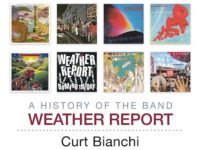Thanks to a cooperative effort with the estate of premier alto saxophonist Cannonball Adderley, the self-described ‘jazz detective’ Zev Feldman has once again brought rough, bootlegged jazz recordings from out of the dark and had them restored into vital, viable releases.
Poppin’ in Paris: Live at L’Olympia 1972, released through Feldman’s Elemental Music label, showcases Cannonball Adderley’s popular quintet when they made a stop at the Olympia Theater as part of the Paris Jazz Festival in October of 1972. Painstakingly remastered, the music sounds great with Cannonball and his well-traveled band still at peak performance, but the time at which this gig was captured holds intrigue, too.
The Burnin’ in Bordeaux: Live In France 1969, another Elemental Music release made available at the same time, happened when Joe Zawinul was still in the band and the vast difference in the sound and repertoire is perfectly representative of the momentous changes that occurred in jazz during the intervening time. Most ironically, one of the primary architects of these changes was Zawinul himself, who did his groundbreaking work while moonlighting outside of Adderley’s band as a collaborator for Miles Davis’ late ’60s fusion experiments, as well as for his own, proto-Weather Report self-titled album from 1970.
Almost a year before the Adderley Quintet’s performance at the Paris Festival, Cannonball signaled his own embrace of the prevailing changes with Black Messiah (1971), which although a live document itself, presented his first post-Zawinul band as a group profoundly influenced by the keyboardist’s then-current role as a progenitor of the jazz-rock revolution that was underway. Replacing him in Cannonball’s band was Frank Zappa’s ace keys whiz George Duke, who was already very much on board with jazz going electric. The rest of the band comprised of Cannonball’s brother Nat Adderley on cornet, Roy McCurdy on drums and Walter Booker, still playing standup bass. While the 1971 recordings consisted of several more supporting players, it’s this base quintet that went to Paris the following year to spread the gospel of Adderley’s crowd-pleasing jazz with a newly updated sound.
“Black Messiah” – the song – is Duke’s tune, who like his predecessor on the piano bench, wrote for Adderley. However, Joe’s fusion influence is strongly detected here as well as the funk jazz Duke would soon make under his own name. It doesn’t start that way: Duke portrays crisp, Corea mannerisms on acoustic piano for about three minutes before his right-hand drifts over to the electric piano. When his left-hand joins the right, he settles into a quote from “It’s About That Time” from Miles’ In A Silent Way and then delves into lush, wandering melodicism; the horns finally arrive to reveal the song’s theme more than six minutes in. Cannonball then delivers a fairly lengthy solo that’s all him and yet couldn’t fit any better into this ‘new’ sound. His brother does him one better, blasting away on his cornet with an urgency somehow positioned somewhere between Davis and Hubbard. Duke later cranks up psychedelic Echoplex effects that even today sound, well, “far out,” and then a final go at the theme by the brothers.
Poppin’ In Paris is worth the cost of admission for this twenty-minute track alone, but more delights await. “Doctor Honoris Causa” also runs for a similar length, but before diving into anything resembling composer Zawinul’s peaceful, atmospheric presentation from his 1970 LP, this one swings. Cannonball – for this track only – blows on soprano sax, as Earl Turbinton did on the original. McCurdy’s drums never stop driving, giving the song a kick that sets this rendition apart. But when McCurdy and everyone else backs off, Duke briefly by himself brings the Zawinul spirit of the original to life.
And then there’s “Directions,” which by this time was a fixture on Miles’ setlist. The familiar theme soon gives way to a rapid post-bop pulse featuring McCurdy thrashing away alone for most of the song, a radically different approach than what Davis and his band undertook.
So, Adderley wasn’t ready to entirely abandon straight, pre-fusion jazz, leaving ties to his career-defining past intact. The popular standard “Autumn Leaves” gets a lengthy reading here that’s more charged than the coolly loping version Cannonball and Miles made definitive for Adderley’s Somethin’ Else. Even though Duke opts for the electric piano, this song bops like hell and features the Adderley brothers doing what they’ve done so well for about twenty years. Duke’s bossa nova piano with Nat playing with some spice closes it out.
Nat’s “Hummin'” is a satisfying slice of funk-jazz that the younger brother brought to the band three years prior and his filthy cornet is perfectly balanced out by Cannonball’s expressive alto sax.
Adderley continued to perform Zawinul’s golden, soul-jazz warhorses like “Mercy Mercy Mercy” and “Walk Tall,” as these songs were always going to be crowd-pleasers. Duke brings a body-moving, hyper-funky electric piano to the latter song that not even the composer could do (or at least, not inclined to do).
Cannonball Adderley’s legacy is primarily tied to his output in the sixties, while his seventies material often gets overlooked. That’s a shame, because he was still fielding fantastic bands and never stopped modernizing his music as he maintained an open mind to absorbing new ideas. Poppin’ in Paris: Live at L’Olympia 1972 should serve to help get his final era the attention it deserves.
Get Poppin’ in Paris: Live at L’Olympia 1972 from Bandcamp.
- Claudio Scolari Project – ‘Bloom’ (2025) - June 12, 2025
- Denny Zeitlin – ‘With a Song In My Heart: Exploring The Music of Richard Rodgers’ (2025) - June 4, 2025
- Ches Smith Quartet – ‘Clone Row’ (2025) - May 30, 2025



